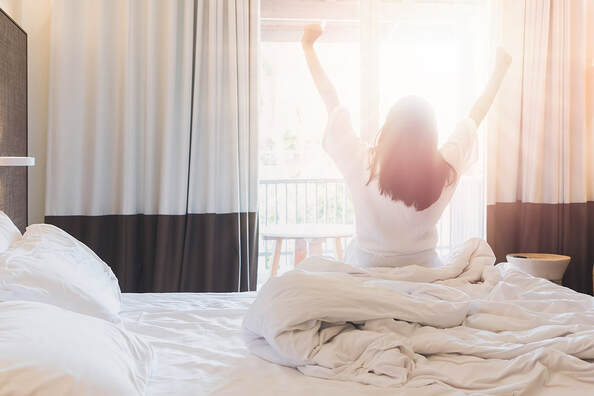On the other hand, if you are a night person you tend to be more active during the afternoon and evening hours and are more prone to staying up late. This disrupts sleep habits which can result in a higher risk of depression.
A study conducted by the UK Biobank used sleep data on participants and found that unnatural sleep habits could cause depression, anxiety, and low well-being. These health problems appear to be caused by the disruption of the circadian rhythm as prior studies suggest that there is a relationship between our sleep cycle and depression. Studies indicate that circadian rhythm disruption can also lead to not enough and poor-quality sleep which could most likely cause mood disorders.
You are less likely to suffer from depression if you are a morning person; your feeling of well-being is more intense, and this may be due to greater light exposure.
- The study by UK Biobank used sleep data gathered from wrist activity monitors that were worn by more than 85,000 participants.
- UK Biobank houses in-depth genetic and health information on more than half a million Brits.
- Author of the UK Biobank study, Dr Jessica Tyrrell, a senior lecturer at the University of Exeter Medical School in the UK, said defying our internal body clock appears to be highly associated with levels of depression, and having a higher misalignment was associated with higher odds of depression.
- Researchers compared the sleep information from the UK Biobank study to self-reports of mood and this indicated that people with a misaligned sleep cycle were more likely to report depression, anxiety and have fewer feelings of well-being.
- Sleep specialist Kristen Knutson, an associate professor of neurology and preventive medicine at Northwestern University Feinberg School of Medicine, said "The health problems associated with being a night owl are likely a result of being a night owl living in a morning person's world, which leads to disruption in their body's circadian rhythms."
- Knutson said, "Light exposure is greater among morning types and may be reduced in those with greater sleep variability. Indeed bright light therapy is a treatment for some forms of depression."
- Other studies have identified a relationship between depression and sleep cycles. Dr Tyrrell says, "The strongest evidence is from shift workers, with some studies suggesting that these individuals have a higher prevalence of depression and lower well-being."
- According to Dr Tyrrell, "if you're a morning person, then you are less likely to have depression and more likely to report a higher well-being. This may in part be due to people who are morning people are less likely to have 'social jet lag.' "
- "Social jet lag" occurs when we go to bed later and wake up later at the weekend than we do on weekdays when we have to get up for work. Dr Tyrrell says, “social jet lag is the consequence of the discrepancy between an individual's biological rhythm and the daily timing determined by social constraints."
- Knutson said another reason for ‘social jet lag’ may be more exposure to sunlight for those who rise early.
Fact |
7-9 Hours Sleep |
< 6 Hours Sleep |
If you’re 18-60 years old, experts say you need at least 7 hours of sleep each night. |
Memories are consolidated while dreaming and during deep sleep, resting long enough to move fully through those sleep stages may improve your memory. |
Get ready to be foggy. Memories are not easily stored and linked in the brain when you’re sleep-deprived. |
Your ability to learn new things drops by 40% when you don’t get enough sleep. |
When your mind and body get regular, high-quality sleep, your mood and sense of wellbeing improve. |
If you’re chronically sleep deprived, get ready to be stressed, irritable and short-tempered. You might also become anxious or depressed. |
Sleeping only 6 hours a night for two full weeks is equal to pulling two all-nighters in a row. |
Your ability to pay attention, solve problems and be creative is directly tied to a good night’s sleep. |
Chronic lack of sleep increases mistakes and reduces performance speed on tasks. You’re also more resistant to change and unable to control your emotions. |
You’re as likely to crash while driving on less than 5 hours of sleep as if you are driving over the legal alcohol limit. |
Getting adequate rest is key to remaining alert and responsive on the road. |
Even one night of bad sleep can slow your reflexes and attention span, putting you and others in danger on the road. |
Every extra hour college students in romantic relationships slept corresponded to greater sexual desire, increased vaginal lubrication and a 14% rise in the chance of having sex the next day. |
A good night’s sleep can increase your sex drive and make it more likely you’ll have sex. |
Being tired and cranky puts on damper on your libido, as well as that of your partner. |
- Exercise regularly, vigorous is best.
- Avoid heavy meals, cigarettes and alcohol in the evening.
- Establish a soothing bedtime ritual with time to unwind.
- Go to bed and get up at the same time, even on weekends.
- Keep your room cool, dim and noise-free.
Good luck. I'd love to hear what you have to say.


 RSS Feed
RSS Feed

















